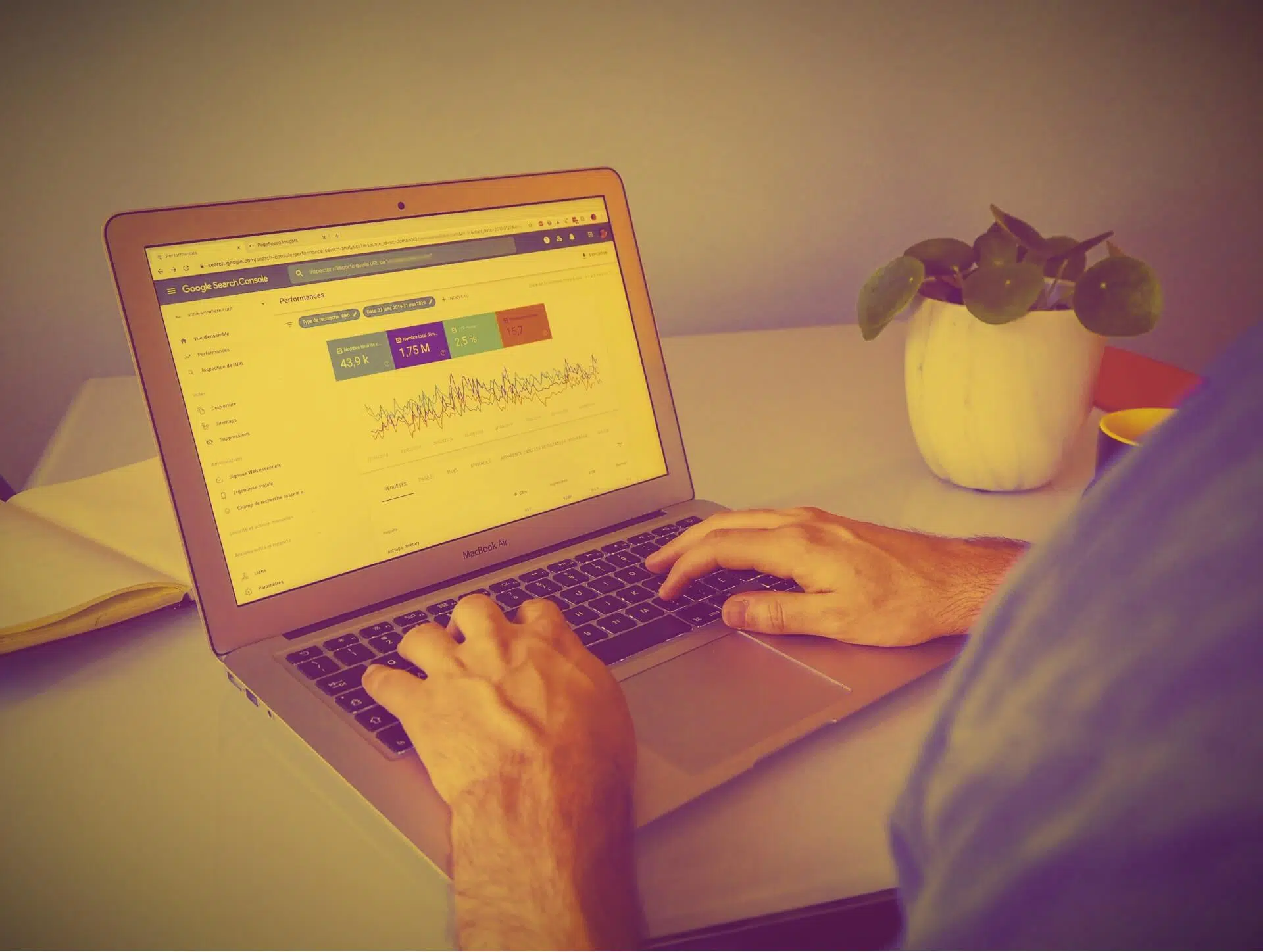
Top 3 Tips When Starting a New Google Ads Campaign
In this episode of Radically Honest Marketing you’re going to learn 3 principles to keep in mind when you’re running a new Google Ads Campaign for a new product or service or your very first campaign on google.
These principles, while relating to Google Ads in this video, could also apply to other paid media campaigns such as Facebook Ads or Youtube Ads. While Google Ads is a constantly evolving platform, some things never change and that’s what we focused on in today’s video. Enjoy.
Episode Highlights
[1:37] Why searching for your own brand or keywords could be hurting the performance of your ads campaigns.
[2:36] The factors that determine where your ads show up on Google.
[4:45] The right way to check that your ads are working
[6:10] Patience is a virtue. Especially when you’re trying to find a winner with new Google Ads campaign.
[6:35] A real-life example of a new campaign we set up that wasn’t going as expected and what we did about it.
[8:48] Why being a cheapskate when it comes to Google Ads is going to cost you more in reality.
[9:20] The parallels between traditional brick and mortar shops and your ad campaigns on Google.
[10:24] How to make the scientific method work for you, plus how to get $600 in free credit to run your first Google Ads Campaign experiment
Table of Contents
Transcript
Raph: Hey, Raph and Joel here, for another episode of “The Radically Honest Marketing Show”. Where we try to share insights, behind the scenes, anything, and just try to be as transparent, and honest as possible with what goes on in the business, or what we suggest to clients, or what’s going on in the industry in general, and tips and things like that.
Why searching for your own brand or keywords could be hurting the performance of your ads campaigns.
Raph: So today, a few points that we wanna discuss, are three things that you should, or shouldn’t do, when you start a new Google Ads campaign, either for the first time, or if you launch a new product, or you go into a new region location, things like that. So whether you’re managing it yourself, or whether you are partnering up with a digital agency like ourselves. So number one is, and this is so common, I think with people, or businesses who have never done any Google Ads, or have been doing it for a while. And that is searching your own keywords, or searching your brand, and seeing if your ad shows up in Google Search. There’s this sort of-
Joel: It’s natural to wanna do it, especially when you just launched a campaign.
Yeah, it seems to be human nature, you wanna see. If you create a billboard on the street, you drive past it, you walk past it, you see it, okay? But in Google Ads, you don’t see it unless you search for it, so the human instinct kicks in. Does my ad appear? Is everything working? So you’ll search your brand name, or you’ll search the main keywords.
Let’s just say you’re a lawyer in Melbourne, Australia. So you search, lawyers, Melbourne, or business lawyers, Melbourne, whatever it is. Is my ad showing? So a few things to keep in mind when you do that. One is if you’ve got potentially maximum four ads at the top of the page, three ads at the bottom of the page, and then you’ve got page two, page three, page four as well. So that comes into it. So you might not see your ad at the top, but it could be that your ad was at the bottom, or it could be your ad was on one of the further pages, our general philosophy is you try and be at the top of the page, in that top section as much as possible, where budget allows, eye line is buy line, as they say in the supermarket world.
But the other factors that you need to think about when you’re doing that, is that Google is analyzing your online behavior. Meaning it knows what pages you visit most. So if you visit your website quite a lot, if you’re on it quite a lot, checking it, then Google knows you go to that site frequently. Therefore, that’s one indicator that Google may say, “Well, we’re not gonna show the ad for that, because you already go to that site quite a lot.”
Number two, if you keep searching your brand, or your products, and you don’t click on your ads, then Google uses that as an indicator. Well, this ad may not be relevant for this sort of search term, therefore we’re gonna show other people’s ads, instead of yours, if you’re not clicking them. And also another part of human nature is clicking on your competitor’s ads. So, maybe that’ll be another topic, why you probably shouldn’t do that, in a very religious way, consistent way.
So those are the sorts of things that Google will look at. And say, “Well, hang on a second, if you’re not clicking on this ad, which is your ad, well, we’re not gonna show it as much.” You’re actually having a negative impact on your potential performance within Google Ads. Does that make sense, Joel?
Joel: Yeah, you’re kind of sending a message to Google, that people are looking at your ad, but not clicking, which means it’s not having the desired effect, which reduces the quality perhaps.
Raph: Yeah, essentially, right. And again, because Google knows that, so there are other ways to go. If you are concerned about your ad not appearing, the best way to check is to actually log into your Google Ads account, and there is an option at the top of the portal where you go to tools, and then you go to ad preview and analysis. And there you can actually type in a keyword, and you can select which location you want, which device you want, whether it’s mobile or desktop, and you can search and see if your ad is working. And it will tell you, “Yes, your ad is working.” Or, “No, your ad is not working, because actually your ad is scheduled to go off.” That’s another sort of subtopic, some people say, “Oh, my ads aren’t working.” We say, “Well, it’s 6:30 PM, your ads only run till 5:00 PM.” Or, “Your budget has run out.” That’s sometimes why an ad might not appear either.
But you can log in and actually check to preview whether your ads are working. That’s the best way to go about it, because that way you’re not affecting your statistics, your results. And also if you do that frequently, then that also affects the person who’s analyzing the results. They’re gonna look and say, “Oh, well this ad, if this was the ad that was getting shown a lot, it gets a lot of impressions, but not a lot of clicks, so we might pause that ad, or change the ad.” But it might be unnecessary, because really it’s been diluted, or affected by frequent searching.
Give Your Google Ads Campaigns Enough Time to Prove Themselves
So that’s tip number one when you’re starting a new campaign, or doing Google Ads for the first time, number two is time. Is allow the new campaign, or the new strategy some time to get some data, and to get the ball rolling, so to speak. One of the constants in digital marketing, is that there’s always gonna be change. So there’s changes in different strategies, changes in different types of campaigns, you can say that the Google’s changing all the time. So we tested out a new type of campaign structure, called performance max, which uses a lot of machine learning, and different types of AI – Google’s very AI crazy at the moment. And it is getting better, and it’s learning faster. It uses different ad assets, instead of just a search ad, it’ll do search, YouTube, display dynamic search ads, Gmail. It’s gonna use different ad assets to try, because at the end of the day, people are making decisions, not just based on one search, one click, and then buy, that’s rare. A lot of us are having multiple touch points, reading an article, speaking to a friend, Googling it. Even after, probably depending on the type of decision, hundreds of touchpoint.
So we tested out this new performance max campaign for a client. And the first couple of weeks went amazingly, and it was really good. And then we made some changes, which we felt that were in the best interests of the company, negative key words and things like that, and then conversions flat lined for a couple of weeks, and I thought, “Oh, this is not a good campaign structure.” However, we gave it time, because we knew that there was a lot of AI, a lot of machine learning involved in this type of campaign. And after a couple weeks, two or three weeks, that’s when conversions started to pick up again. So the machine was learning, okay, after you made that change, it took it a couple of weeks to learn, how to find the good opportunities again, for that type of campaign. So that’s the thing is you need to allow time, and now it’s actually, we haven’t made another change since things picked up, and things are going really, really, well for that. To the point that we’re gonna actually start rolling it out, for a lot more of our accounts that we manage. And again, it’s a very new type of campaign performance max.
Joel: So that that’s number two, right? It’s time.
You Need to Give Your Google Ads Campaigns Enough Budget to See Any Kind of Results
Time. Number three is budget. And before I talk about budget, well actually, no, I’ll just say that basically the approach of, “I’ll just stick my toe in the water and see how it goes.” Generally doesn’t work in Google Ads, or paid ads probably for any channel. Because if you’re not giving the campaign enough budget, to get enough people clicking on the ad, and going to your site, well, you’re not gonna have enough sample data to work out whether this is the right approach or not.
Imagine you’ve got a shop, and you’ve spent tens of thousands of dollars, maybe hundreds of setting up the shop, buying the product, getting the staff, and you put that shop in a side street, that barely any people walk past, and a few people just walk into the shop, or walk past the shop. Then after a little while, you’re gonna say, “Well, maybe this isn’t the right business.” Or, “Our products aren’t good.” Or, whatever. But you haven’t put yourself in the right bit of real estate, whereas if you put yourself in a busy area, a commercial area, where there’s lots of cafes, and lots of people walking past, depending on the type of business that you are, then you’ve got to get a lot more people walking into the shop, seeing the shop, coming in, and you’re gonna know much faster, whether this is a successful business, or not.
And the same methodology has to apply to your website, to your business online. Because at the end of the day, Google is a bit of real state, its digital real estate. And your ad takes up a bit of that real estate on page one of the search results, and so you wanna give yourself enough budget, to get enough traffic coming through to your site, so that you can actually see, is it working, is it not working? And the faster the data comes through, the faster that you can make changes, or the agency managing it for you can make changes, say, “Okay, well, this part of the campaign works, let’s double down on that. This part of the campaign doesn’t work, that’s a waste of money, let’s pause that.”
Google Will Give You Up to $600 in Ad Credit for New Google Ads Accounts
So you need to give yourself enough budget. And the good thing is that if you’re starting a new Google Ads account, Google has increased as of Feb, 2022, they’ve increased the amount of ad credit that you can get up to $600. It used to be $150, now they match your ad budget up to $600, which is great. And then they’re acknowledging that it does take a bit of time, like I said before, but also budget, it is a cost per click campaign. You wanna give yourself the best bang for buck, as fast as possible. And then you can actually get better performance, faster that way.
The Scientific Method As it Applies to Google Ads and Digital Marketing
Joel: If you think about it, we sometimes try and think of things from a scientific perspective, right? If you’re conducting a scientific study, and your sample size is very small, the results are not meaningful. They’re not what’s called statistically significant, and therefore you can’t actually draw conclusions from ‘them.
Whereas, if your sample size is large enough, then you end up with meaningful data, that you can then draw conclusions about, in terms of what’s working and what’s not working, you can make changes based on that.
Raph: Yeah, exactly. That’s the very scientific way to explain it, but that’s exactly correct. So look, those are three tips, these are like three general suggestions that I think that you should have in mind when starting a new campaign account. I’m happy to hear your feedback. If you feel there are any other suggestions, or if you have any questions, and if you like our content, like what we are sharing with you here, feel free to subscribe to our channel, like our videos, so that Google knows, we’re going back to what we were talking about. So Google knows that the information is relevant, and could help other people out there. So thank you for listening, and I think we’re done.
Joel: Thanks very much everyone.




